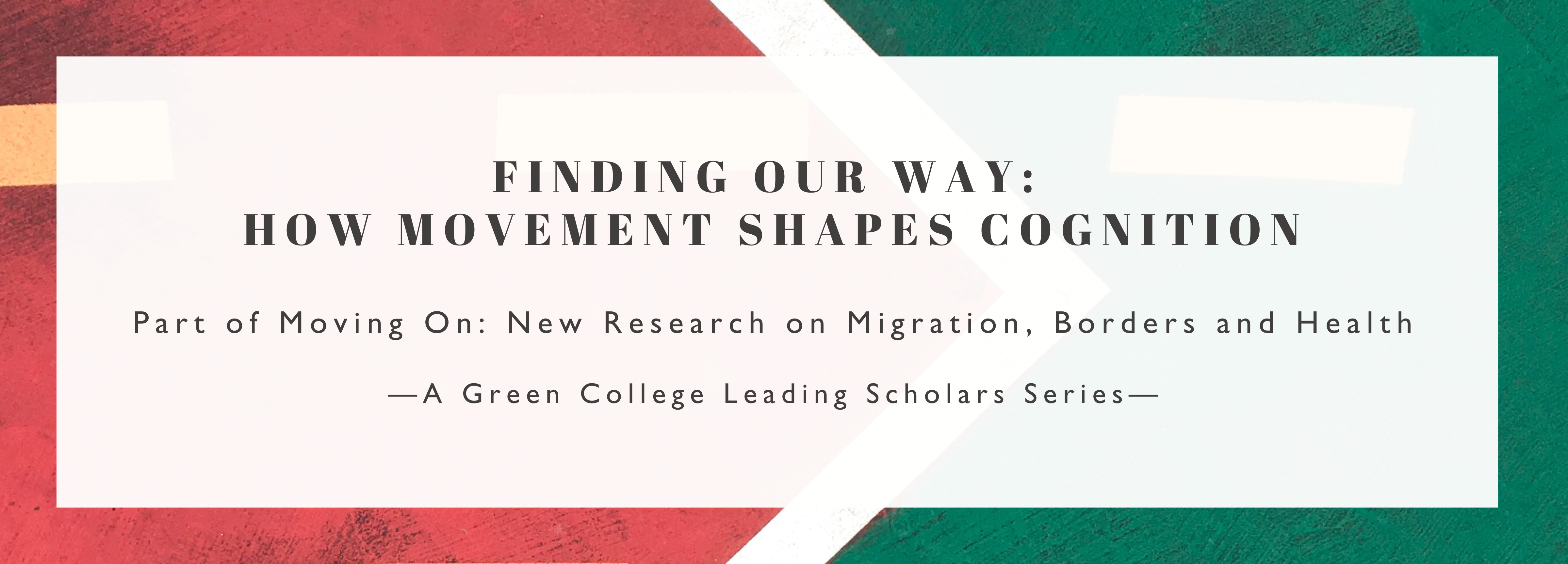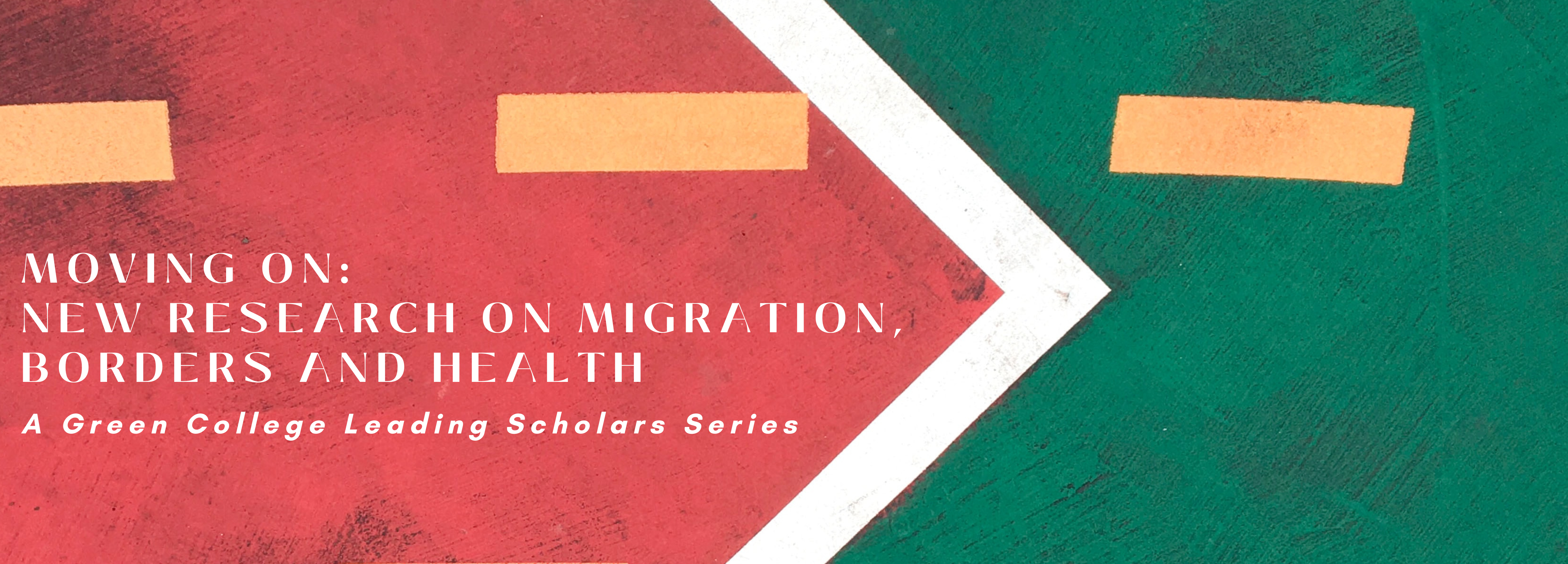Finding Our Way: How Movement Shapes Cognition

-
Manu Madhav, Biomedical Engineering; and Elise Stickles, English and Language Literatures; with Teresa Liu-Ambrose, Canada Research Chair, Physical Activity, Mobility and Cognitive Neuroscience; and Physical Therapy
Coach House, Green College, UBC, and livestreamed
Wednesday, November 16, 5-6:30pm, with reception to followin the series
Moving On: New Research on Migration, Borders and Health -
In this third event of the Moving On series, two Green College Leading Scholars and a guest speaker will delve into the ways in which our brains, minds and bodies are intimately linked through movement and cognition. Movement shapes the way we use language, and language shapes the way we think. Movement improves health and quality of life, and can prevent cognitive decline. Movement maps the world around us, and these maps allow us to form memories and solve problems through abstraction. Please join Teresa Liu-Ambrose, Manu Madhav and Elise Stickles as they navigate a journey through metaphor, movement and memory that will be sure to stretch your mind.
 Teresa Liu-Ambrose is an Associate Professor, a Canada Research Chair and a physical therapist in the Department of Physical Therapy, UBC. She directs the Aging, Mobility and Cognitive Neuroscience Laboratory as well as the Vancouver General Hospital’s Falls Prevention Clinic . Her research program focuses on defining the role of exercise to promote healthy aging, with a particular focus on cognitive and neural plasticity, as well as mobility. Various method are utilized, including randomized controlled trials, functional neuroimaging and actigraphy. Teresa Liu-Ambrose works collaboratively with faculty in Psychology, Neurology, Family Practice, Geriatric Medicine, and Health Care and Epidemiology. She is an investigator with the Centre for Hip Health and Mobility and the Djavad Mowafaghian Centre for Brain Health. She also co-leads the UBC data collection site for the Canadian Longitudinal Study on Aging.
Teresa Liu-Ambrose is an Associate Professor, a Canada Research Chair and a physical therapist in the Department of Physical Therapy, UBC. She directs the Aging, Mobility and Cognitive Neuroscience Laboratory as well as the Vancouver General Hospital’s Falls Prevention Clinic . Her research program focuses on defining the role of exercise to promote healthy aging, with a particular focus on cognitive and neural plasticity, as well as mobility. Various method are utilized, including randomized controlled trials, functional neuroimaging and actigraphy. Teresa Liu-Ambrose works collaboratively with faculty in Psychology, Neurology, Family Practice, Geriatric Medicine, and Health Care and Epidemiology. She is an investigator with the Centre for Hip Health and Mobility and the Djavad Mowafaghian Centre for Brain Health. She also co-leads the UBC data collection site for the Canadian Longitudinal Study on Aging..jpg) Manu Madhav is an Assistant Professor in Biomedical Engineering at UBC. He investigates how the brains of animals, including humans, create maps of the external world and represent them as neural activity, how we use these ‘cognitive maps’ to navigate, and how this ability to represent and navigate degrades due to neurodegenerative diseases such as Alzheimer’s. His lab (NC4) designs and builds experiments where rats or humans navigate physical or virtual-reality environments. They record neural activity from rats and behavioural responses from both rats and humans. Using analysis techniques from control theory, robotics and machine learning, they extract structures hidden within neural and behavioural data.
Manu Madhav is an Assistant Professor in Biomedical Engineering at UBC. He investigates how the brains of animals, including humans, create maps of the external world and represent them as neural activity, how we use these ‘cognitive maps’ to navigate, and how this ability to represent and navigate degrades due to neurodegenerative diseases such as Alzheimer’s. His lab (NC4) designs and builds experiments where rats or humans navigate physical or virtual-reality environments. They record neural activity from rats and behavioural responses from both rats and humans. Using analysis techniques from control theory, robotics and machine learning, they extract structures hidden within neural and behavioural data..jpg) Elise Stickles is a cognitive linguist specializing in metaphor analysis; in particular, she studies variation in metaphoric usage across linguistic varieties and genres by applying methods from corpus and computational linguistics. Currently, she is focusing on a comparative analysis of metaphors for cancer and COVID-19 in American and Canadian Englishes. She maintains the MetaNet metaphor database, which documents metaphors used in American English and Spanish, and is now expanding it to include Canadian English and French. She obtained her MA and PhD in Linguistics from the University of California, Berkeley and then completed a postdoctoral teaching fellowship at Stanford University before joining UBC as an Assistant Professor in 2019.
Elise Stickles is a cognitive linguist specializing in metaphor analysis; in particular, she studies variation in metaphoric usage across linguistic varieties and genres by applying methods from corpus and computational linguistics. Currently, she is focusing on a comparative analysis of metaphors for cancer and COVID-19 in American and Canadian Englishes. She maintains the MetaNet metaphor database, which documents metaphors used in American English and Spanish, and is now expanding it to include Canadian English and French. She obtained her MA and PhD in Linguistics from the University of California, Berkeley and then completed a postdoctoral teaching fellowship at Stanford University before joining UBC as an Assistant Professor in 2019.
Humanity has never been more mobile than it is today. Migration comes in many different shapes and forms, and it impacts those who move and those who stay put in multiple ways. Across roundtable and panel discussions, keynote talks and an edited book presentation, this Green College Leading Scholars Event Series adopts diverse multidisciplinary perspectives from cultural studies, medicine, history, linguistics, neuroscience, psychology, political science and bioengineering to dissect and explore the meaning of fast-moving people in a fast-moving world and its implications for our personal and societal physical and mental well-being.
Series Conveners: Anna Blakney, Biomedical Engineering; Benjamin Bryce, History; Annie Ciernia, Biochemistry and Molecular Biology; Megan Daniels, Ancient Mediterranean and Near Eastern Studies; Friedrich Götz, Psychology; Manu Madhav, Biomedical Engineering; Matias Margulis, Public Policy and Global Affairs; Elise Stickles, English Language and Literatures; Daniel Vigo, Psychiatry, and Population and Public Health; Lydia Wytenbroek, Nursing; and Ayaka Yoshimizu, Asian Studies.

-
Unless otherwise noted, all of our lectures are free to attend and do not require registration.
6201 Cecil Green Park Rd
Green College, UBC
Vancouver, BC V6T 1Z1
Canada
Custom Lecture Fields
|